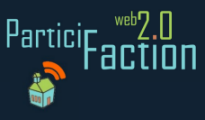The study of "Humanities" has been around for some time, but with the advent of computers and the Internet,the field of Digital Humanities has evolved. In their article on Defining Digital Humanities, Davies & Osborne assert that collaboration and "thinking through making" are essential elements of the field. They point out, that "the revolution of text is changing how we access, interpret, and use literary and research materials," and that "digital humanities increase the potential of possibilities for our lives and our relationships with ideas, language, and each other."
It sounds to me like the functions and benefits of Web 2.0 align pretty solidly with those of Digital Humanities. It will be interesting to see if the development of this relatively new discipline ultimately parallels, overlaps, or meshes with the development of Web 2.0 tools and functionality. The development of the study of Digital Humanities re-enforces the importance of the productive human qualities of collaboration and thinking through making: all Web 2.0 qualities as well.
Thursday, February 18, 2010
Thursday, February 11, 2010
Careful about assumptions!
I often hear teachers talk about the "kids today" and how computer savvy they are; it seems like whenever there's a teacher that needs some tech. assistance, there's a capable student willing to help. In my experience, however, there are just as many kids incapable of performing what might now be considered basic computer skills, and when you narrow the field to capable Web 2.0 students, the numbers drop again.
I think that teachers group all students as capable for a couple of reasons: the idea that there's always a student who can help might lead to the assumption that all students can help; teachers make assumptions about the ubiquitous technological capacities of students based on a small -- and willing -- sample set. The assumption that all students have glowing computer skills also lets teachers off the hook: "I don't need to teach them anything about computers: they know it all."
While it's fair to say that most students are capable of setting up a Facebook account and doing a Google search, I think that we need to take responsibility, as teachers, for expanding and refining the Web 2.0 skill sets that will lead these kids to successful futures.
More studies, such as the revealing, recent PEW Survey, may help us to get a handle on just what Web 2.0 tools most kids use and don't use, and thus let us make better choices -- and fewer assumptions -- about what we need to teach and what we don't.
I think that teachers group all students as capable for a couple of reasons: the idea that there's always a student who can help might lead to the assumption that all students can help; teachers make assumptions about the ubiquitous technological capacities of students based on a small -- and willing -- sample set. The assumption that all students have glowing computer skills also lets teachers off the hook: "I don't need to teach them anything about computers: they know it all."
While it's fair to say that most students are capable of setting up a Facebook account and doing a Google search, I think that we need to take responsibility, as teachers, for expanding and refining the Web 2.0 skill sets that will lead these kids to successful futures.
More studies, such as the revealing, recent PEW Survey, may help us to get a handle on just what Web 2.0 tools most kids use and don't use, and thus let us make better choices -- and fewer assumptions -- about what we need to teach and what we don't.
Subscribe to:
Comments (Atom)



